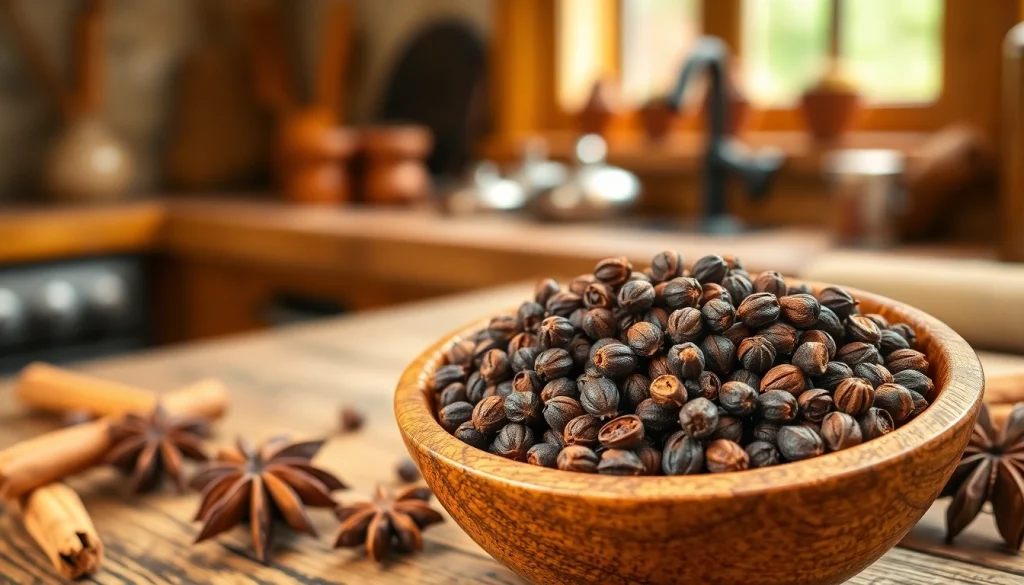The Rich History of Cloves
Origin and Cultivation of Cloves
Cloves are the aromatic flower buds of the Syzygium aromaticum tree, belonging to the family Myrtaceae. Native to the Maluku Islands of Indonesia, commonly known as the Spice Islands, these tiny yet potent buds have been cherished for their unique flavor and fragrance for centuries. Cloves thrive in tropical climates, requiring warm temperatures, high humidity, and well-drained soils to flourish. Most of the world’s cloves are now grown in Indonesia, Madagascar, and Sri Lanka, where traditional farming methods have helped sustain their quality and flavor.
Culinary Uses: A Global Perspective
Historically, cloves have played a significant role in global trade, valued by ancient civilizations such as the Romans, Egyptians, and Chinese for both their culinary and medicinal properties. Today, cloves are utilized in various cuisines worldwide. In Indian cooking, they form an essential component of spice blends like garam masala and biryani. In Western culinary traditions, they are often associated with holiday baking, flavoring dishes such as mulled wine, gingerbread, and baked ham. Their warm, sweet-spicy flavor profile enhances not only savory dishes but also desserts, making them incredibly versatile.
Cultural Significance and Traditions
Cloves are not merely a culinary staple; they also hold deep cultural significance in many societies. In Indonesia, cloves are a key ingredient in the popular kretek cigarettes, flavored with clove oil. Furthermore, cloves are often used in traditional medicine in various cultures, particularly in Ayurvedic practices, where they are believed to possess numerous health benefits. Festivals and religious ceremonies across different cultures often incorporate cloves, either as offerings or as essential ingredients in traditional dishes, emphasizing their role in bringing people together during celebrations.
Health Benefits of Cloves
Nutritional Value and Antioxidants
Cloves are not only flavorful but also packed with nutrients. They contain essential vitamins and minerals, including vitamin C, vitamin K, and manganese. Manganese, in particular, is crucial for metabolizing carbohydrates, proteins, and cholesterol, making cloves a valuable addition to a balanced diet. Moreover, cloves are rich in antioxidants, which help combat oxidative stress and reduce inflammation in the body. The high antioxidant content is primarily attributed to a compound called eugenol, which has been extensively studied for its health-enhancing properties.
Medicinal Properties and Applications
Cloves have been utilized in traditional medicine for centuries, particularly for their analgesic, anti-inflammatory, and antibacterial properties. Clove oil, extracted from the buds, is often used as a natural remedy for dental pain, thanks to its eugenol content, which provides a numbing effect. Furthermore, cloves may contribute to better liver health and improved digestive function. Recent studies suggest that cloves can help lower blood sugar levels and improve insulin sensitivity, making them a beneficial addition for those managing diabetes. However, incorporating cloves into your diet should be done with caution and awareness of appropriate quantities, as excessive consumption could lead to gastrointestinal upset.
Potential Risks and Precautions
Despite their myriad benefits, it’s essential to be mindful of potential risks associated with cloves. Clove oil, when used excessively, may cause irritation and allergic reactions in some individuals. Moreover, due to its ability to lower blood sugar levels, individuals with diabetes or those undergoing surgery should consult healthcare providers before using cloves or clove oil to avoid complications. Pregnant and breastfeeding women should also exercise caution in their use of cloves.
How to Use Cloves in Cooking
Spice Blends Featuring Cloves
Cloves can elevate the flavor profile of numerous spice blends and are particularly integral to several traditional mixtures. For instance, the Indian garam masala relies on the warm depth of cloves, while in Moroccan cuisine, the blend known as ras el hanout often features cloves along with an array of other spices, enhancing the complexity of dishes such as tagines. Creating your spice blends can also allow for experimentation. A simple blend could include ground cloves, cinnamon, nutmeg, and cardamom, offering a fragrant seasoning for baked goods or warm beverages.
Clove-Infused Recipes for Everyday Meals
Incorporating cloves into your cooking can be simple and rewarding. Consider adding whole cloves to stews, rice dishes, or soups for an aromatic touch. One popular recipe is spiced lentil soup, where cloves complement the earthy flavor of lentils beautifully. Additionally, baking recipes such as apple pie or pumpkin bread benefit from the warm notes of cloves, enhancing the overall flavor experience.
Making Clove Tea: A Simple Guide
One of the least complex ways to harness the benefits of cloves is by making clove tea. To prepare, simply steep 3-5 whole cloves in hot water for about 10 minutes. You can enhance the flavor by adding a slice of lemon or a drizzle of honey. Clove tea not only serves as a soothing beverage but also offers digestive benefits and a warm comfort during colder months.
Buying and Storing Cloves
Choosing High-Quality Cloves: What to Look For
When purchasing cloves, quality is paramount. Opt for whole cloves rather than ground for better flavor and freshness. Look for plump, dark brown buds with a strong, aromatic scent. Fresh cloves will have a potent aroma, while stale or low-quality cloves will have a diminished fragrance. Consider sourcing your cloves from reputable suppliers, such as Cloves vendors who emphasize quality and sustainability.
Proper Storage Tips for Freshness
To maintain the potency and flavor of your cloves, proper storage is essential. Store whole cloves in an airtight container in a cool, dark place, away from direct sunlight. When kept properly, whole cloves can last for up to a year, while ground cloves typically last about six months due to their higher volatility. For longer-term storage, consider freezing cloves, which can retain their flavor integrity for even longer periods.
Where to Buy Cloves: Online and Local Sources
Cloves can be found in grocery stores, spice shops, and specialty food stores. Local health food stores often carry organic varieties. Online retailers also provide a wide variety of high-quality cloves, making them easily accessible. Popular platforms like Amazon and specialty spice websites are good sources for buying organic or sustainably harvested options.
Exploring Essential Oils and Extracts
Benefits of Clove Essential Oil
Clove essential oil, extracted from the flower buds and stems of the clove tree, is highly valued for its myriad health benefits, including antibacterial, antiviral, and anti-inflammatory properties. It is frequently used in aromatherapy to relieve stress, enhance mental clarity, and invigorate the senses. Additionally, cloves in their oil form can serve as a natural insect repellent and pain reliever for minor ailments.
Uses of Clove Extracts in Natural Remedies
Beyond culinary applications, clove extracts have found their place in many home remedies. Combining clove oil with carrier oils can create a topical application to soothe muscle aches and pains, accented by its warming properties. It’s also commonly mixed with other essential oils to create a potent blend for diffusers, enhancing air quality while providing health benefits.
DIY Clove Oil Recipes and Applications
Creating your own clove oil at home is a straightforward process. Simply infuse whole cloves in a carrier oil, such as olive or coconut oil, by allowing the mixture to sit in a warm, sunny spot for a week. Strain the cloves out, and you’ll have a fragrant oil perfect for cooking or therapeutic uses. Always perform a patch test before widespread application to avoid any adverse reactions.


